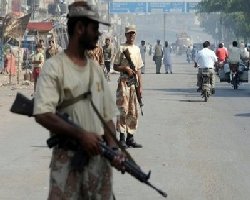Karachi shuts down as city mourns
21/10/2010| IslamWeb
Karachi, Pakistan's commercial hub, shut down on Wednesday for a day of mourning after a fresh wave of violence that has killed at least 72 people since Saturday.
Violence first erupted in the city on Saturday ahead of a by-election to replace a provincial legislator who was murdered in August.
Police said four people were killed in different incidents on Wednesday, bringing to 32 the number who have died in the last 24 hours.
Ten people died in a single attack on Tuesday in the Sher Shah area.
Al Jazeera's Kamal Hyder, reporting from Islamabad, said: "Schools are closed, markets are closed and there is very little traffic on the roads and of course the political parties are all saying that their people were the victims even though the residents of Karachi know that the victims were on all sides.
"There has been some trouble in certain parts of the city, shops and hotels set on fire."
It has been difficult to maintain security in Karachi, home to Pakistan's main port, stock exchange and central bank and the main gateway for Western military supplies bound for neighboring landlocked Afghanistan.
'Turf war'
It was not clear whether Tuesday's attacks were related to the violence that erupted in the wake of the run-up to the by-election.
"The gravity of violence is high, as 1,000 people have been killed during the past year," Amir Latif, the bureau chief of Pakistan's largest independent wire service, Online News Network, told Al Jazeera.
"Ethnic violence is increasing with every passing day ... The city is still burning."
Hyder said the recent unrest stemmed from a political power struggle.
"For the last few months, various political parties have been battling for control of Karachi," he said.
"The Awami National Party and MQM are fighting what appears to be a turf war. The Awami National Party is MQM's main rival for political posts and control of the city.
"The people of Karachi have been held hostage by these political groups."
Karachi has long been plagued by political and ethnic violence. Some violence in the city is also linked to criminal gangs.
Zafar Jaspal, a security analyst and associate professor of international relations at Kai-ee-di Azam University, told Al Jazeera that the tensions signify "a shifting trend in the power politics of Karachi".
Underlying the conflict, he said, are demographic changes linked to the major internal mass displacements to the city in recent years - one due to military operations, and the other because of flooding.
Karachi generates 68 per cent of the government's revenue and 25 per cent of Pakistan's gross domestic product.
PHOTO CAPTION
Pakistani paramilitary soldiers stand guard in Karachi.
Al-Jazeera
www.islamweb.net

